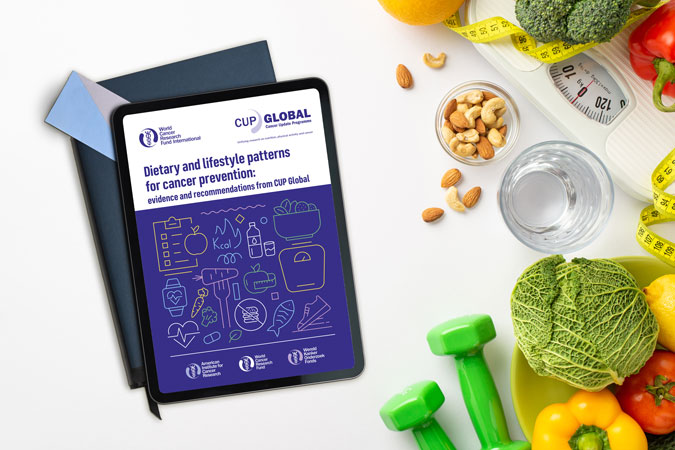MR is a statistical method, a way to analyse data, that uses people’s genetic variation – in other words the different genes that we carry and which form our unique footprint.
This variation helps to approximate a dietary exposure independently of other dietary exposures and – ultimately – pinpoint a causal effect to a specific nutrient. This effect will be distinct from other factors that might be correlated with that nutrient, as part of people’s diet or lifestyle.
This is possible because, if there is a lot of data available, at a population level that unique footprint is less likely to be associated with environmental factors, which are precarious and may confound the associations found from observational studies.
World Cancer Research Fund supports many MR projects and the research community that delves into this field to shed light on the causal relationship between nutrition and multiple cancer sites.
We have already funded 9 projects in the UK, France, Japan, Germany and Sweden. More recently, we have supported the MR in Nutrition and Cancer workshop, a working group from experts in the field.
A position paper from that workshop provides two key outputs:
- an overview of MR, discussing applications and providing examples of MR studies in nutrition and cancer.
- the limitations of the tool, and how to overcome those to translate findings from MR studies into nutritional recommendations and policies for cancer prevention, that will be used from the scientific community around the world.
Challenges of Mendelian randomisation
Of course, as with every statistical method, MR comes with its own challenges. You need studies with large sample sizes to avoid biases, which is often difficult to achieve unless different teams work together and pool data from smaller studies.
It’s crucial to have enough data to showcase a robust association between nutritional traits and genetic variation in the population.
This association, in turn, increases our level of certainty in the findings and their interpretation – which is called statistical power – and the chances of detecting relationships of modest strength that are not obvious.
Another challenge originates from the limited understanding of the biological mechanisms that underpin the detected associations and this requires caution when interpreting the findings.
Scientists have achieved great progress in developing methods to mitigate those challenges, such as performing more sensitive analyses, and forming large consortia and international collaborations. In an attempt to expand the focus of MR studies beyond populations of European ancestry to tailor findings to other populations as well, they have also increased the number of trans-ethnic databases.
Nutrition is a puzzle of complex and interconnected relationships, but the scientific community is devoted to unravelling the mystery. The aim is to give us clear explanations and modifiable nutritional risk factors for cancer development and progression, and the belief is that MR has the potential to contribute significantly to those efforts.
This is of particular importance to us as we embark on the next phase of the Global Cancer Update Programme. MR will complement existing methodologies for evidence synthesis and interpretation, and will equip us with robust evidence and up-to-date recommendations for specific cancer sites.
Our MR grants
Bethany van Guelpen
> The role of inflammation in the link between obesity and colorectal cancer
Michael Leitzmann
> Physical activity, sedentary behaviour and cancer risk in people with comorbidities
Laure Dossus
> Exploring the link between obesity and endometrial cancer
Konstantinos Tsilidis
> Why does food increase or decrease the risk of colorectal cancer?
> Comprehensive assessment, validation and causal identification of dietary exposures and cancer risk
Sarah Lewis
> How does physical activity lower the risk of cancer?
> Identifying which nutrients may cause or protect against prostate cancer
Shoichiro Tsugane
> The protective effect of consuming polyphenols on colorectal cancer risk in Japan
Emma Vincent
> Are metabolites associated with obesity causing colorectal cancer?
Paul Brennan
> The impact of obesity and insulin on cancer risk
Leading cancer prevention and survival charity, World Cancer Research Fund (WCRF) today announces research findings showing that higher body weight measured by body mass index (BMI) in early to mid-adulthood means a poorer survival rate for both breast and colorectal (more commonly known as bowel) cancer patients.
BMC Cancer research findings
The research, which was published in BMC Cancer, studied a European cohort of 159,045 patients tracked between 1992 and 2000. BMI measurements were taken on a frequent basis. Findings show that for adults aged between 20 and 50, an increase in BMI of 1kg/m2 meant a 6% increase in death rate for bowel cancer patients. For breast cancer patients, for every 1kg/ m2 increase in BMI there was a 4% increase in death rate.
Findings also showed that although a history of cardiometabolic disease (CMD) such as type 2 diabetes and cardiovascular disease is associated with a 46% increase in risk of death, BMI has a direct effect on cancer survival irrespective of whether the individual also has CMD.
Dr Panagiota Mitrou, Director of Research and Innovation at World Cancer Research Fund, said:
Adding to the wealth of research on two common forms of cancer, this study shows that exposure to higher body weight in early to mid adulthood plays a major part in cancer prognosis. We know that maintaining a healthy weight throughout your lifetime isn’t always easy, yet the importance of doing this cannot be overstated.
Dr Heinz Freisling, Scientist at International Agency for Research on Cancer and study author, said:
This multi-centre study was carried out to further explore the relationship between comorbidities and cancer survival. It is striking that both BMI and cardiometabolic disease were found to have a direct bearing on survival outcomes independently of each other for bowel and breast cancer patients at two key points in adulthood. This suggests that the increased risk of dying due to patients being overweight or obese cannot be explained by comorbidities.
World Cancer Research Fund’s Eat Well During Cancer offers advice to people on a healthy diet and lifestyle. Based on the latest scientific research, the guide is practical and simple to understand for those living with cancer.
Breast cancer is the most common form of cancer in the UK. There were more than 2.26 million new cases of breast cancer in women in 2020.
Bowel cancer is the fourth most common cancer in the UK, with the second highest mortality rate. There were more than 1.9 million new cases of colorectal cancer in 2020.




